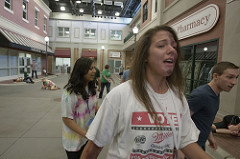Monthly Archives: October 2015
This post is not about the virtues or detriments of of gun control specifically. It is more about the philosophy behind the positions. If you want to argue about gun control policy specifically, I recommend doing so in the preceding thread linked below.
Last week, in my vent about the gun control debate, Murali asked the very sensible question… what’s so wrong with gun control:
Unless you are an anarchist, you think the state is justified. Moreover, one of the basic functions that you think the state can legitimately perform is internal security. Clearly there are some ways in which the state may infringe your property (or more properly your holdings) or else the state could not even tax you to fund a police force. Clearly too, there are some measures which the state may not take (e.g. the patriot act) to ensure security. {…}
Weapons are not morally innnocent property, but belong to a type which is intended to inflict violence, something that is prima-facie illegitimate.
A weapon is a tool that is intended to inflict violence or the threat thereof. Even in defensive uses of a weapon, the weapon has defensive use only because it can threaten the aggressor with violence.
The precise justification for the existence of a state (i.e. an entity which maintains a monopoly on the legitimate use of force) is that the complete liberty to use force as and when you see fit would be horrible if everyone had it. The basic fact is that it is very nearly always an improvement of the state of affairs when this liberty is curtailed to some significant extent. Just thinking how far away we are from a Hobbesian state of nature in terms of our liberty to inflict violence on one another as and when we see fit and correspondingly how much better off we are as a result underwrites the justification for the state. That is to say, to say that the state in general (or in most cases) is justified just is to say that the delegitimisation of most private violence is justified.
My response was that I am not in favor of gun ownership as a universal right, but rather that it’s context-independent. I might well support rigorous gun control in Singapore while opposing it in the United States. There are a number of reasons for that, involving history, geography, and culture. Which Murali describes as a “pragmatic matter.”
That’s partially, but not entirely correct. I almost said as much in the thread, but Gabriel touched on it himself:
For me, I’d say it’s almost completely pragmatic. But sometimes some measures are so impracticable that to pursue them would be almost a wrong in itself. Not that there isn’t potentially a lot that can be done, like registration or coding bullets with identifying information, and perhaps requiring owners to carry liability insurance.
I also believe in something like a natural right to self-defense, which implies in my opinion the right to legal access to some of the means of self-defense. Those means don’t have to be firearms, but in a heavily armed society, I’m willing to concede that such access is part of the right.
When it comes to hunters, I don’t have a problem with them. I don’t particularly want to get in the weeds over whether they have a “right” to their firearms (leaving aside the question of the 2d amendment) or whether it’s merely sound policy to let responsible people hunt.
The middle paragraph is important. In a context where you could actually keep guns out entirely or almost entirely, and where guns are not embedded deeply into the culture, it seems highly desirable to keep them out of the hands of the people. However, once they are widely available, it’s not just impractical to try to put that cat back in the bag, it does border on the immoral. That is partly because, as Gabriel says, a general right to self-defense. But it’s also because of how troublesome it is to make harsh laws against what is culturally commonplace. Which brings me to Christopher Carr’s post Over There about Saudi Arabia’s caning an elderly man and whether or not we can call that barbaric. To which Maribou responded:
My problem with these kinds of comparisons is that “our” society is very difficult to view objectively, and so trying to compare it with another one is a tricky business.
Is it really so much better to lock people up in prison for years or decades for smoking pot?
It’s not like long prison sentences don’t carry the same kind of risks to life and limb that caning does.
(I think it’s abhorrent, what is going to happen to that man, and what happens to women in Saudi all the time. I just think our equally abhorrent things get a cultural pass, so there’s not much point in trying to valorize our own culture based on its ideals rather than its practices.)
And Dragonfrog added:
I came here to make that point.
I have seen nothing to dissuade me from holding that drug prohibition has to be considered as a whole – whether the prohibited substance is ethanol, caffeine, THC, morphine, cocaine, LSD, etc., it is either barbaric, or it isn’t. There don’t exist two categories of drugs, one of which one can non-barbarically prohibit and the other of which one cannot.
Given the above, the only question that might produce a contrast between Saudi Arabia and the US or Canada is whether caning is more or less barbaric than imprisonment or asset forfeiture.
First, I would say that “barbaric” is an awfully heavy word. And with that, even if our own failings in this regard do not approach Saudi Arabia’s, they’re close enough that it’s hard to see how the line between here and there being the line between “civilized” and “barbaric” is anything but a self-interested rationalization. If they are barbaric, then so are we. And if we are not, if we can (even while disagreeing with our own policies) see nuance, Saudis should be afforded the same generosity of nuance.
At the same time, if Dragonfrog is arguing that prohibition is an all-or-nothing deal, that we cannot view differently a society throws people in prison for dealing in lactose milk due to some religious observance and one that throws people in prison for dealing in cocaine… I can’t really agree with that. They may both be barbaric or neither be barbaric, but they’re in different points along the spectrum.
While I do not presently favor blanket decriminalization, I don’t defend the War on Drugs, or the hard hard we use in its enforcement. taking a soft hand, of course, may result in more people doing more drugs. At the very least, a War on Drugs that is never fought definitionally cannot be won. That means, among other things, accepting that people are going to die doing (many) drugs. They’re going to ruin their lives. Of course, the War on Drugs hasn’t stopped any of that. But what if it could? Or rather, what if it could make it exceedingly rare? Would you support it then? A lot of libertarians wouldn’t. I might.
The War on Drugs ruins lives. It rips children away from their parents. It sends otherwise relatively law-abiding individuals to prison. Fathers, sons, mothers, daughters. It can wreck the lives of people who would otherwise never harm anyone. To be willing to do that, you must have a degree of confidence in your success. To do otherwise isn’t just a misallocation of resources or unwise policy. It crosses the line from being merely misguided to being actively harmful dependent entirely on the context.
And that’s where I’m coming from when I talk about taking a different view on guns depending on the context. In that sense, it really is a matter of pragmatism. However, it doesn’t really stop there.
A light-handed approach would be largely ineffectual. A heavy-handed one would be actively harmful. Like the War on Drugs, it would be unsuccessful in the United States. Geography, history, and culture. And we would be left with the choice of throwing fathers, mothers, and sons into prison. Of taking children out of their homes and putting them into a foster care system that is more dangerous than a home with a gun in it. Throw in prosecutorial discretion, and you likely have selective enforcement and racist enforcement. You likely have escalating sentences to keep induce more and more compliance. Pursuit of the goal of getting rid of most guns in this country would likely require burning the village to save it. And then, not actually saving it. That may not be the goal, but I do see it as the result.
Nobody envisioned flashbombing cribs when it was decided that drugs should be illegal. We got there through an increasing desire to win The War and, perhaps most importantly, an increasing indifference to offenders. The amount of animosity towards gun owners is already immense. Gun owners injuring themselves is joke fodder or and just last week a writer at Salon said injuring them should be public policy. And in a way, it’s rational. If these people are responsible for the deaths of countless others, why should they be treated as people and not like any other criminal? Why should they be immune from jail? And on and on.
But that’s what something being illegal means. You can have intermediate steps. You can have jail as the last resort. But the more stubborn the populace, and the more justified they see themselves as being, the more people you’re going to have to take stronger measures against. That’s the question that you have to ask yourself. You have to break eggs to make an omelet. But understand the eggs, and understand the omelet. Breaking eggs to know end isn’t just impractical.
"What ho, Thomas?" cried Sir Topham Hatt. "Back from the railyard so soon?"
Wordlessly, Thomas pulled back, revealing a shadowy figure.
— ≠ (@ThomasHCrown) September 29, 2015
His wheels ground along the track as he came to a halt. He hurt so badly, he couldn't even feel his coal box. But there would be a price.
— ≠ (@ThomasHCrown) September 29, 2015
The shadowy figure lurched up slowly, haltingly, a glint of metal in his hand. Hatt peered closely, then gasped. "CYRIL! BUT YOU'RE DEAD!"
— ≠ (@ThomasHCrown) September 29, 2015
"Dead," he rasped, as if savoring both the feel and taste of the word in his mouth. "Dead. No. But not because you didn't try."
— ≠ (@ThomasHCrown) September 29, 2015
Nervously, Hatt backed up, using the panic button to summon Salty and the Dockyard Enforcers. Wheels turned unnoticed behind him.
— ≠ (@ThomasHCrown) September 29, 2015
"I'm quite sure I don't know what you mean," Hatt boomed, trying to keep steady. Just under five minutes from the docks at full steam.
— ≠ (@ThomasHCrown) September 29, 2015
"The foghorn," Cyril replied, swinging the bright steel crowbar lazily back and forth. "The goddamn foghorn AND THE LANDSLIDE OLD MAN."
— ≠ (@ThomasHCrown) September 29, 2015
He shouldn't have survived. James may not be able to haul a coal car worth a damn, but he was a professional. Hatt cleared his throat.
— ≠ (@ThomasHCrown) September 29, 2015
"We were so worried," he began. Four minutes. He could hear Salty's chant in the distance. "…and the captain yawns…"
— ≠ (@ThomasHCrown) September 29, 2015
He almost tripped over the cowcatcher behind him. Wheeling, he saw Percy's unmoving eyes drilling into his soul. "YOU," he sneered.
— ≠ (@ThomasHCrown) September 29, 2015
Percy was silent, but steam wheezed out of cracks in his top pipe. Hatt turned back to Cyril.
— ≠ (@ThomasHCrown) September 29, 2015
Still just over three minutes. He could hear Salty's insane sea shanties in the wind, but they were still too far.
— ≠ (@ThomasHCrown) September 29, 2015
"Why, we spent hours looking for you, Cyril," Hatt said, noting that the other man had stopped just short of crowbar range.
— ≠ (@ThomasHCrown) September 29, 2015
"My fathce," came the low, haunted sound from Thomas. Hatt looked more closely and saw for the first time the ruin of stillness there.
— ≠ (@ThomasHCrown) September 29, 2015
"I can't move it, OLD MAN," Thomas wheezed. "I never could. But you took even the thmile from me, jusht to inthtall a FOG HORN."
— ≠ (@ThomasHCrown) September 29, 2015
"It's NOT LIKE THAT!" Hatt cried. Under two minutes. The Dockyard Destroyer was so close. Just a bit longer. "We had no idea–"
— ≠ (@ThomasHCrown) September 29, 2015
Thomas creaked forward, the left half of his face a wreck of metal and rock. "How much wath the inthurance claim? HOW MUCH WATH YOUR THOUL?"
— ≠ (@ThomasHCrown) September 29, 2015
"Yo ho ho!" came the bloody, faux-Scottish cry. Salvation. Hatt opened his mouth to gloat when the ungodly sound of metal tearing began.
— ≠ (@ThomasHCrown) September 29, 2015
"Your friends are off to Satan's Scrapheap, HATT," Cyril growled. "JAMES is already waiting for them."
— ≠ (@ThomasHCrown) September 29, 2015
Closer. The crowbar could reach flesh now. "Do you think Edward didn't know why you sent him over the Big, Big Bridge again and again?"
— ≠ (@ThomasHCrown) September 29, 2015
Screams of absolute pain pierced the night as Edward and Gordon began using Cranky's corpse to string up the Dockyard Enforcers.
— ≠ (@ThomasHCrown) September 29, 2015
He'd known this day was coming. He'd seen the hate in Percy's eyes when he'd given the mail route to Harold.
— ≠ (@ThomasHCrown) September 29, 2015
He'd seen the pain in Thomas's eyes when Harvey met his untimely end — of love and loss and rage.
— ≠ (@ThomasHCrown) September 29, 2015
But he had an island to run. No coal-driven antiquities with frozen, cheery faces could stand in the way of that.
— ≠ (@ThomasHCrown) September 29, 2015
How to explain the end of the depreciation writeoffs, the spiraling labor costs, the fact that coal was really dirty and disgusting?
— ≠ (@ThomasHCrown) September 29, 2015
And when he'd found Cyril conspiring with Thomas to smash all the automatic foghorns? To undo all of his hard work?
— ≠ (@ThomasHCrown) September 29, 2015
There had been no going back. Nor would there be now. He still had some cards left to play in this bitter hand.
— ≠ (@ThomasHCrown) September 29, 2015
Social media and modern sensibilities: Unfriending is workplace bullying and sending too many follow requests harassment.
Credit where due: Alan Sepinwall admits when he is wrong, and a long time back he was very wrong about the prospects of a new show called CSI.
Zach Barnett argues that college football really needs to do something about the length of its games. It seems to me that keeping the clock running on first downs up to the last two minutes of each half would be a good place to start.
Kerry Howley explains the self-absorption of our response to the death of Cecil.
Lyft is going country, but Nashville is apparently especially susceptible to a robot invasion, coming to seize their jobs.
Tent cities in Tennessee: Should Nashville accept tent cities as a short-term approach to a lack of affordable housing? {via Chris}
Jack Hitt is not a fan of Paul Theroux’s new book on the South.
Utah is apparently adding a pretty significant “Doctor tax.”
Jews have gradually shifted in the public mind to being more white than not, but Gil Steinlauf wants that play called back.
The Economist reports that the “model minorities” may be losing patience.
In the UK, Mohammed Umar Farooq read a book about terrorism, which was declared a red flag that he might be a terrorist.
The Telegraphy denounces the EU as an oligarchy and says it’s time for the UK to leave.
No Offence causes offense.
Explained from the inside, how Jeremy Corbyn rocked the Labour Party.
It sucks when Americans don’t like your ethnic food and apparently when they do.
Oregon put that to rest, and in some ways the screaming seems even louder here as it was there. It was, of course, immediate. So, too, were the pre-emptive calls “not to politicize it” which I don’t disagree with but were pretty blatantly opportunistic (often accompanied by explanations for why this is why no zone needs to be a gun free zone and a sudden and disingenuous concern for mental health). I’ve past the point where I am inclined to tut-tut about politicizing it. I would prefer that we wait at least 24 hours to absorb what happened and learn what actually happened, but that’s too much to ask for.
Pro gun control people have lost all patience with the “Don’t politicize” argument, and I can actually understand where they’re coming from. As said, a lot of it is opportunistic. Just push back the talk date until the next shooting happens, then push back the talk date again, all the while talking about (or having surrogates talk about) the need for concealed and open carry. I will confess at one point my beliefs about taste and decorum may have been influenced by political self-interest. But after Newtown, I have been convinced that it is indeed an ineffective strategy and even possibly a counterproductive one for gun control advocates… and I still wish they wouldn’t do it. There may still be self-interest involved, but of the more personal self-interest of curiously not liking to be called pro-massacre and a desire after each and every tragedy not to end up in proverbial screaming matches with my friends. But as far as moving the needle is concerned, they seem destined to lose and I consider that a good thing because they deserve to lose.Being on the anti-gun control side of the argument in discussions like this is a case of trying to hit a moving target. Informed from the start that we can’t even pretend to care about this blood and death unless we are on board with their program. But when you point out that the proposed gun control measures would likely have no effect on the incident in question, you’re told that it isn’t actually about this blood and death – this blood and death that absolutely necessitates that we must argue about this before the facts are in and the bodies are cold – is not the point. It’s about shootings in general.
Except that almost none of the mass shootings that make the headlines are particularly vulnerable to gun control. They’re typically people that have their guns legally, or people capable of bypassing all but the most restrictive anti-gun laws. If moderate gun control has an effect, it’s in reducing crimes of passion, crimes of opportunity, and various shades of manslaughter caused more by recklessness than ill-intent but leaving innocent people dead all the same. And suicides. I’m not going to commit to moderate gun control having any positive effect in reducing gun crimes (though I would suicides and accidental deaths), but this is a misdirection.It’s a misdirection that seems to be born in a theory that isn’t bearing out. The idea, at some point, was that nobody will support gun control to save the lives of urban minority youths in Chicago. But if you use cases where the victims are white, then they will take notice. This seemed to almost work in the 90’s, but it’s a script that gun supporters just aren’t playing their part in. And I think that’s frustrating their opposition.
Especially frustrating to well-intentioned people on all sides is this: This is a subject on which there is very limited middle ground. If any. Especially when it comes to mass shootings. For gun control supporters, it leaves them in a position where they simultaneously assure gun rights advocates that nobody is talking about confiscation while endorsing actions abroad which involved a lot of confiscation and pointing to them as exemplars of the efficacy of gun control. For opponents, it means shrugging off changes that seem like “common sense” because they know the rallying for more gun control won’t really stop until the mass shootings do (if then) and the moderate steps won’t have much of an effect in taking down the biggest banner used by the other side.What measures will keep the guns out of the hands of these shooters that doesn’t also prevent most others from getting guns? Not just the Oregon shooter, but Newtown or Lafayette or Aurora? We could peer into their lives in search of mental illness or something, but the signs are not always obvious without hindsight and could be the sort of thing that prevents a lot of people from getting help. With theaters you could use metal detectors perhaps, if you’re willing to endure massive inconvenience for high-profile incidents that make up a relatively small proportion of deaths. Gun free zones are unlikely to have an effect on people unworried about dying or going to prison.
And you can say “It’s not about these specifically” but as long as these are a reason that we must talk about gun control, gun control needs to be connected to these events. And if you argue “Yes, gun homicides as a whole are down but mass shootings are up and so we have to take action” then the action should be related to mass shootings. If you wave the bloody shirt, you own the bloody shirt. Especially when, in my view, the increase in mass shootings is not unrelated to the publicity that they receive. So when I read arguments that pro-gun people need toThose are crappy reasons to actively oppose partial-measures that would do good on the margins. And I try not to let that influence my thinking too much. There is, however, still the case to be made that the partial-measures would actually do good on the margins, and when the arguments are often made in a bundle with allusions to other countries that have more radical measures in place and rhetoric that demands more radical measures, it’s not a winning argument to me, but those are the arguments made in the heat of the moment and tend to push me further back on to my side of the line. Not to the point that I will reflexively oppose everything, but a point where calling for “common ground” rings hollow.
Which leaves us where? The Democratic Party thinks it has found a winning issue. The Republican Party is crossing their fingers that they do with an eye towards Ohio and Pennsylvania. This is largely a replay of the 1990’s and the school shootings that seemed for a time to make it look like the issue was going to be an albatross around the GOP’s neck. Until the 2000 election approached, and the Democrats looked at the states in play and realized it wasn’t. Maybe things have changed because the NRA has overplayed its hand, or maybe not.In the interim, it takes a lot of work for me not to see the tirades of the would-be gun controllers as a form of hysteria. A view that I am not entirely comfortable with, though which I naturally find less offensive than their belief that I don’t care about dead people unless I get with their program. They ask “So you are just content to let these things happen?” Well, I wouldn’t say that, but I stipulate in their way of seeing things (I am with the program or I am not) I can see why they do. And to some extent… yes. We accept death every day. We try to minimize it where we can easily do so, but always in balance with other considerations. That can be called being pro-massacre, or being an adult.
And that, sadly, is where we are.
Dr Phi wants to know why the GOP so frequently seems to have more candidates than the Democrats:
But since 1992, it seems like the Democrat field has never been as crowded. Of the three elections since then in which the Democrats haven’t run an incumbent, the number of candidates with non-trivial delegate counts or vote totals have been:
2000: 2 (Gore, Bradley)
2004: 4 (Kerry, Edwards, Dean, and Clark (barely))
2008: 2 (Obama and Hillary)
The Republicans, in contrast, run more candidates:
1996: 5 (Dole, Buchanan, Forbes, Alexander, and Keyes
2000: 3 (Bush McCain, Keyes))
2008: 4 (McCain, Romney, Huckabee, and Paul)
2012: 4 (Romney, Santorum, Gingrich, Paul)
Which brings us to 2016. The Democrats have two declared candidates (Clinton and Sanders), one undeclared candidate (O’Malley), and one rumored to be testing the waters (Biden). Meanwhile, the Republicans have some 15 candidates serious enough to participate in one of the Fox debates.
Methodology is a bit of a question here. He uses the number of candidates with non-trivial delegate counts. That’s one way of going about it, but it’s a relatively rough measurement for how many candidates each party has. It may well be true that the Democrats weed candidates out more quickly than the GOP – or maybe not – but delegate rules differ between the parties and it excludes entirely candidates that at least in some point in the process had credibility (think Edwards in ’08) and included some with little (Alan Keyes). I also wanted to go back further than 1996.
So I looked at three different metrics: How many candidates actually announced (the GOP will have 17 by this metric)? How many were still there in Iowa and New Hampshire (so Perry and Walker would be excluded from this count)? And how many were around for the long haul? The last one was most difficult, but I defined it as getting more than 10% of the vote in any state (excluding their home state) in one of the last 25 primaries. I went all the way back to 1976, which was the second election in the primary era and the first that included competitive races for both parties.
The end result is… well, there’s just not that much difference in the parties in the longer run. Since 1996, there is, but that’s because it excludes the two elections where the Democrats smelled blood and had huge fields and no obvious candidate (1976 and 1988). Since then the GOP had large fields (ten or more announced candidates) three times (2016 is the fourth) while the Democrats haven’t. However, in terms of announced candidates the Democrats actually had eight in ’04 and ’08. But the end result going back to 1976 is that the GOP had an average of 7.1 candidates compared to 6.9 for the Democrats. The numbers don’t actually change all that much if you look at Iowa and New Hampshire or candidates in the race for the long haul. The Democrats have 5 and 2.9 respectively, compared to 4.6 and 2.6 for the GOP.
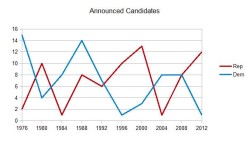 –
–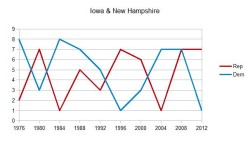
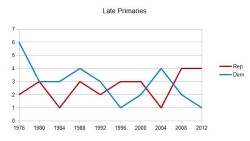 –
–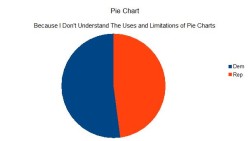
If you look at announced candidates since 1996, you do get the biggest difference of 8.8 Republicans to 4.2 Democrats. By the time we get to Iowa and New Hampshire, there’s still a difference but less of one as there are 3.8 Democrats to 5.6 Republicans. By the end of the primaries, it’s 3 to 2.
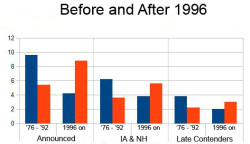 So that’s… not insignificant. To the point that it complicates the original “the parties are the same” thesis. The question is, how significant is it? Why has the tide turned? Before this year, the two largest fields were Democratic ones before ’96, but since then the Democrats haven’t hit ten once while the GOP has three times?
So that’s… not insignificant. To the point that it complicates the original “the parties are the same” thesis. The question is, how significant is it? Why has the tide turned? Before this year, the two largest fields were Democratic ones before ’96, but since then the Democrats haven’t hit ten once while the GOP has three times?
The most obvious question is whether this is merely a product of incumbency, but if that’s a factor it’s not an especially large one. Especially over the whole data set, where the GOP had two uncontested primaries (1984 and 2004) as did the Democrats (1996 and 2012). Republicans had contested incumbents in 1976 and 1992, but so did the Democrats in 1980. Broken down to before 1996 and after that does skew things a little bit, but the overall trends hold even if you entirely exclude incumbent party primaries.
One possibility is that there are just random trends and it will go back and forth. Or maybe it’s not random. A theory I can imagine gaining traction is that it coincides with the crazification of the GOP and it’s a symptom of that. If so, though, how crazy were the Democrats during the 70’s and 80’s? Maybe very crazy, if Jane’s Law (“The devotees of the party in power are smug and arrogant. The devotees of the party out of power are insane.”) has any traction. Or if we wish we can come up with a benign reason for one and a less-than-benign reason for the other.
Notably, though, most of the largest fields have come in circumstances like 2016, where one of the parties has been in office for eight years. That ties into my (very tentative theory), which is that large fields come when parties are trying to find themselves and dealing with internal conflict. In 2008 and especially 2000, despite in each case the party being out of power for eight years, there had been a consensus on which direction the party should go. The Democrats had eight candidates in 2008, but they did not represent terribly different visions of what the Democratic Party should be and was mostly a matter of who should advance that vision. In 1976, candidates ranged from George Wallace to Scoop Jackson to Jimmy Carter. It’s more complicated in 1988, but you can still see it. And in 2016, it’s very much there.
That’s just a theory, and not a hill that I am going to die on defending. And it relies on a degree of chance. The problem with the political science of presidential elections is that the sample set is always small. Sure, we are nearing sixty elections, but the facts on the ground change regularly. The parties and issues and coalitions change. With primaries in particular, there have only been eleven elections that they’ve picked the nominee, and those eleven elections have taken us all the way from Vietnam to here.
Perhaps the biggest mystery to me, to be perfectly honest, is why – with all of the senators and governors and celebrities looking for their chance to shine – we don’t have a dozen or more candidates every election.
A conversation in the football post Over There, the size of Texas came up. Said Glyph:
When I was driving cross-country, I tried to stay off Interstates as much as possible, and some long Texas highways were the only ones where I kind of got scared, like, “if my car breaks down, I could DIE out here before I ever see another human being!”
When moving across the country, it seems natural to measure progress by states. the problem with doing this is that it can make Texas a very dispiriting experience. Especially when you go the route we go.
There are two ways to get from the Southeast to the northern Mountain West. The most obvious way involves the Great Plains. It’s also the fastest way, but it’s also very, very boring (no offense, Mr Cain). On the other hand, if you go through Texas and the northeastern tip of New Mexico, you get to drive along the Front Range. The problem is this:
It’s like the route is designed to keep you in Texas as long as humanly possible. And not, sadly, the more interesting parts like the Hill Country or the Mountains in the west of the coast. It’s the flat, dry, and treeless portion.
And if you’re making your progress by state lines, can be a very long 2-3 days.
Anywhere, he’s a music video of a Robert Earl Keen song about a (proverbially) long road:
Here’s another REK video about Corpus Christi, which is not on the aforementioned route (audio only):
 Gynecological Gymnastics… from Outer Space.
Gynecological Gymnastics… from Outer Space.
A North Korean refugee wants to return to North Korea.
I do think that running for president does kinda sorta mean that you don’t get to have your name trademarked in quite the same way you did when you were a business brand.
This is a really bad idea.
Police chase, Kansas style! (It involves officers unloading on a combine being driven away by the assailant)
I thought we had a bad moving experience, but… could have been worse.
In Australia, the 11 year old totally wanted, so the 21 year old goes free.
Shell is pulling up its stakes and leaving the Alaskan Arctic.
Thanks to plenty of win and subsidies, Texas wind power producers were paying people to use their electricity.
R-Street criticizes a plan to charge solar customers for energy they’re not using. I could actually imagine it being a defensible policy, but the forces behind the policy certainly raise questions.
An East Tennessee police officer is suspended after refusing to shoot a skunk that needed to be shot (and tested for rabies).
If these policies had been in place at the outset, I’d likely still be smoking. {More}
“The phrase is ‘the death of the middle.’ We’re getting to a place where there’s going to be too much dramatic content. The best will always be bought and continue to rise in price. In the U.S., there are 62 buyers for drama. There is a lot of demand for the best, but that middle goes away or drowns. It’s the best or the cheap and cheerful.”
Scott Sumner writes of how the Chinese are apparently abandoning the city to return to the country, and how there may be no housing bubble there.
In Alternet, psychotherapist William Doherty questions his own historic assumptions and wonders if we approach divorce too selfishly.
Historically Black Colleges and Universities
Inside Higher Ed has a piece on HBCU’s scheduling payout games, where they play on the road against vastly superior teams. They take a beating, but make a lot of money. I don’t like it when FBS teams schedule FCS ones, including Southern Tech, but I must confess I cringe a little extra when we schedule an HBCU. They are not only FCS, but are are not competitive even in that subdivision.
I honestly think it would be better if the HBCU’s kind of went their own way. There are two HBCU conferences and one (SWAC) of which already doesn’t abide by FCS rules and exempts itself from the playoff. The other (MEAC) participates in the playoffs but rarely make it far. If they played one another for some trophy, I’d watch that game.
The article presents it as being mostly about giving the big schools an opportunity to fine-tune their schemes and players before starting conference play, but that’s only part of it and I would argue that it’s the smaller part of it. Nor is it strictly a matter of wanting a guaranteed win. The biggest reason is that big schools pull in a ton of money per game, and so it’s more lucrative to play a 7th or 8th home game and rent a doormat for a six figure payout. FCS programs almost always play these games on the road. Lower-end FBS program (so-called G5 schools) will also often take buyout games, but they’re more expensive. It’s also common that they get a 2-for-1 game. Whenever either of these happen, though, the G5 school will then turn around and schedule an FCS team so that they get at least five or (usually) six home games a season.
While I would prefer see FBS vs FCS games end for the most part, it does benefit all involved. The programs need the money and want the exposure. And – though this doesn’t apply to HBCU’s) sometimes they win and it’s something that will be remembered for decades. Which brings us to…
North Texas vs Portland State
The North Texas Mean Green (an FBS/G5 program) lost to Portland State (FCS) 66-7, which is likely the largest margin by which an FBS has ever lost to an FCS program. Now, Portland State is a pretty outstanding team this year, having previously defeated Mike Leach’s Washington State (which last week defeated Oregon at Oregon). Even so, that’s a staggering loss and North Texas’s coach, Dan McCarney, was immediately fired.
McCarney was shafted by Iowa State some time back. Neither of the Cyclones’ subsequent coaches have matched the success McCarney had there. It seemed like a good hire on paper, and actually seemed to be when McCarney took the Mean Green to their first bowl game in quite a while. Things went downhill after that and nobody knows why. Their last hire, Todd Dodge, was a bit of a risky one (straight from the high school ranks to the college ones), but McCarney wasn’t. Perhaps it goes back to the original sin of firing Darrell Dickey, a coach who had outstanding success for a while (26 straight conference wins, three conference titles), had two losing seasons, and was fired in 2006. They’ve had one winning season since. The angry alumn who owned the naming rights to their playing field demanded it be renamed Darrell Dickey Field.
Portland State, meanwhile, may have the most successful coach around. He hasn’t just beaten two FBS opponents, but he did it at a school that has trouble getting 3,000 people to show up to its games and where former NFL Coach Jerry Glanville couldn’t even find any success. I’ve got my eye on him.
Maryland
Also fired was Randy Edsall at Maryland. I have no strong opinions of that firing, though their chosen replacement is shocking.
Mike Locksley was hired by New Mexico with much publicity. On paper, it was a great hire and (as the school’s first black head coach) historic to boot. But now if you ask me “What is the worst coaching hire in recent college football history” I would probably say “Mike Locksley.” In just over two season, he incurred a sexual discrimination lawsuit, a sexual harassment accusation, got into a fight with an assistant coach, and got picked up on a DWI. Also, he went 2-26 at a school that won six or more games in seven of its last eight seasons. The program still hasn’t recovered.
Anyway, he is the interim head coach at Maryland now.
Southern Cal
Not fired (for now), but on leave is Southern Cal’s head coach Steve Sarkisian. After being hired away from Washington, Sarkesian has struggled at USC though not to the point that you would expect USC to take action until the end of the season (if then). However, a series of incidents suggest that he has an alcohol problem that has gotten the better of him. Thus making USC the fourth school to have an interim coach less than half way into the new season. (The first is Illinois, who fired their coach before the season began after allegations of player abuse.)
Central Florida and the Rivalry That Isn’t
The fifth may be Central Florida. Before the season started, head coach and interim athletics director George O’Leary allegedly told administration that he might want to move into the AD office full time. There is a lesson here, and that lesson is that a coach tells you that it’s time for him to stop coaching, you should listen. It’s the same lesson Florida learned when Urban Meyer needed to “retire.” Meyer is back, of course, but he clearly needed the break. Florida convinced him to stick around for an extra year and it was a remarkably unimpressive year. But UCF is not in the mood to listen, apparently.
The most recent game was against UConn. This is the notably one-way rivalry. UConn has declared UCF to be a rival and UCF says that sure they will take the trophy if they win they guess. Which, of course they didn’t.
I… get the argument here, but no. You can paint it as a collective action problem, but you can’t really paint it as honorable or noble. Relatedly…
A goat at a Tim Horton’s in Canada was arrested by the RCMP, who I am sure were very apologetic to the goat about the inconvenience.
Jay d’Brooklyn makes the uncomfortable argument that despite the outrage at the horrifying and evil nature of it, there’s not much we can do about Afghanistan’s boys.
The Governor of Alabama and his wife are getting a divorce.
Jesse Singal is not impressed with the UN report on cyberharassment.
Katy Perry is a pro.
In a piece about replacing John Boehner, Voteviewblog reveals something interesting: as southerners have switched parties, the ideological divide between southern and northern congresscritters has become larger in the GOP than in the Democratic Party.
I’m not a fan of Trump, but autographing protest signs is pretty cool. Jeb Bush, meanwhile, has the political smarts of a walnut.
The Democratic Party’s says it has a 200 year history fighting for civil rights, but starts its history right after Woodrow Wilson.
What will the presidential candidates look like in 2025? USA Today is on it! Rand Paul seems to look more presidential with age. It seems to overestimate how much hair I suspect Ted Cruz will have.
I’ve been saying pretty regularly that the appropriate analogous Republican primary isn’t 2012, but 2008. It’s good to see the New York Times making the connection, right down to the hazard of Rubio being Romney. (Trump as Rudy, Jeb as McCain, Cruz as Huckabee, and Carson as Thompson.)
John B Judis looks at the Middle American Radical that’s propping Trump up.
German mayors are looking to build up for incoming refugees. Which is better than kicking people out of their homes, I guess, though the political tide in Germany may be turning as the number of refugees climbs to 1,500,000.
When it pays to be Syrian, migrants will become Syrian. The Danes are concerned.
Refugees are less than impressed and Nordic countries are squabbling among themselves over the issue. {More}



